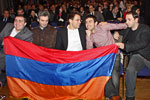


38th Chess Olympiad Dresden 2008The Olympiad took place from November 12th to 25th, 2008, in the Congress Hall in Dresden, Saxony, Germany. 156 teams from 152 nations participated, with most of the top players present. Prize Giving in DresdenBefore we come to the pictorial report on the closing ceremony and the prize winners of the 38th Olympiad in Dresden, here are some statistics provided to us by the organisers. There were 2,169 participants, of which 1,270 were players, 110 arbiters, trainers and officials. They came from 141 different countries. 722 men played in 146 teams, 548 women in 111 teams. |
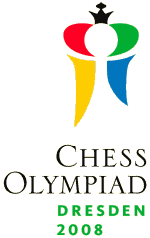 |
The total number of games played was 6,050. All of them were broadcast live over the Internet. This required 514 sensor boards to be connected with computers, with ten Gigabyte per second Internet access, provided by five Blade Centers with multiple servers, and around two hundred additional computers. A total of over 52 million persons visited the Chess Olympiad through the Internet.
Two heads of state (Kirsan Ilyumzhinov and Serzh Sargsyan), a German cabinet minister (Wolfgang Schäuble), an Oscar winner (Artur Brauner), a first league football trainer (Felix Magath), a boxing world champion (Arthur Abraham) and eleven world chess champions visited the event. 453 journalists were accredited. A total of 13,083 chess fans visited the Olympiad.
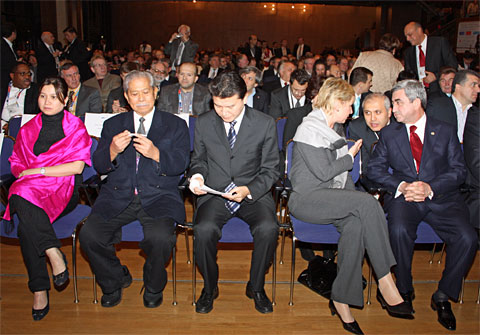
Front row at the closing ceremony: Lace and Florencio Campomanes, Kirsan Ilyumzhinov,
the Lady Mayor of Dresden Helma Orosz and the President of Armenia Serzh Sargsyan
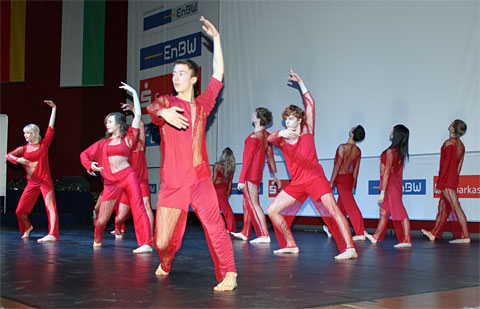
A ballet number, one of the visual highlights of the evening
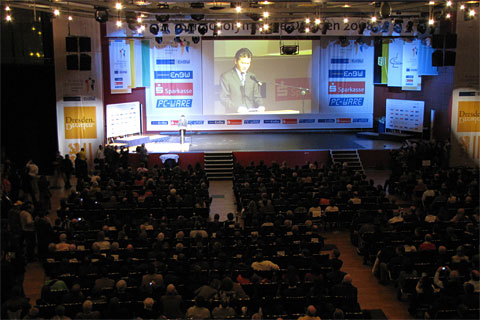
The FIDE President speaks to the players, delegates, dignitaries and visitors
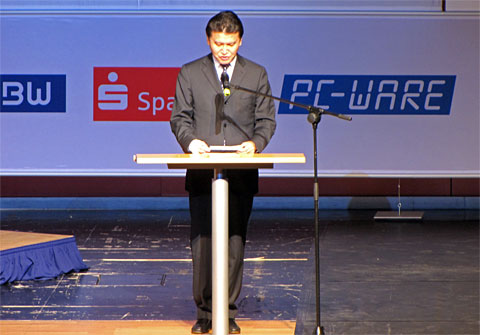
Kirsan Ilyumzhinov speaks to the audience in well-formulated English
Before the start of the Olympiad the Technical Administration Panel of FIDE divided the teams into five rating categories, on the basis of their position in the initial overall ranking list, with each categories contain approximately an equal numbers of teams. Every team that finished with the highest score for its category, provided that it has not won medals, received a prize of money or goods.
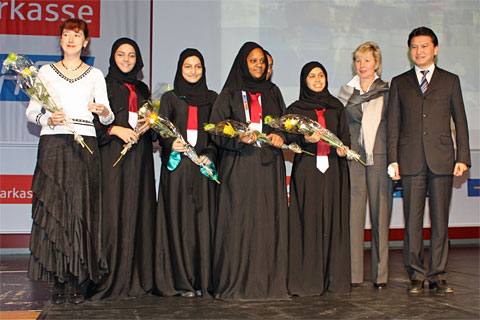
The Group E winners in the women's section: Qatar
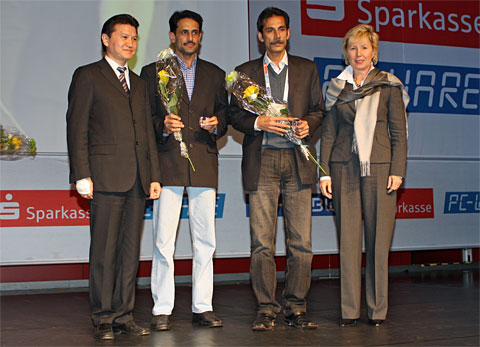
Group E winners in the Open section: Pakistan
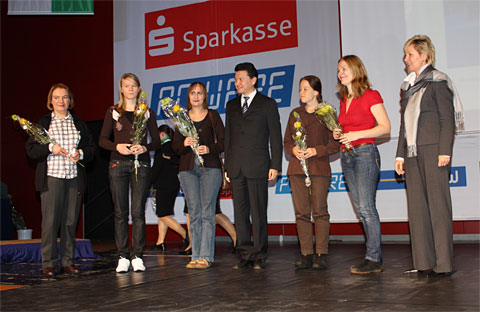
Group D Women: Finland
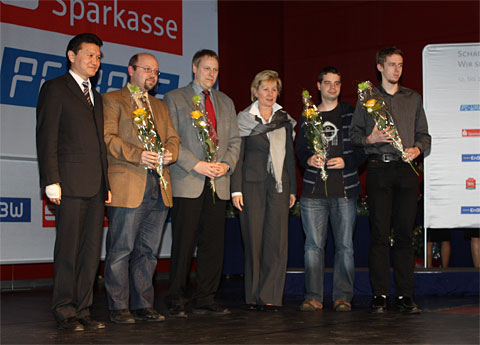
Group D Open: Luxembourg
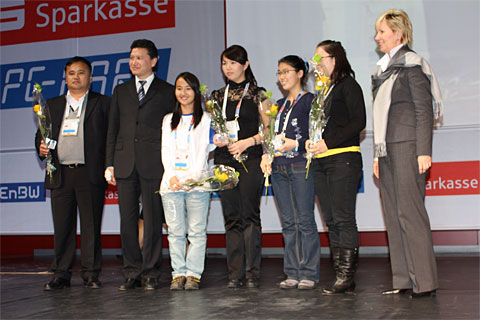
Group C Women: Mongolia
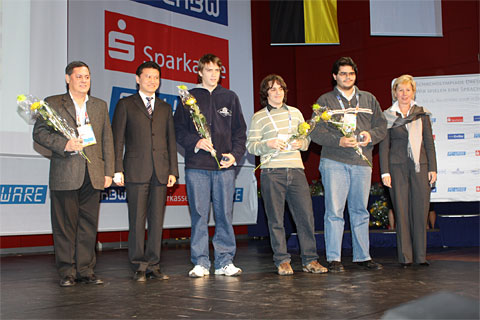
Group C Open: Paraguay
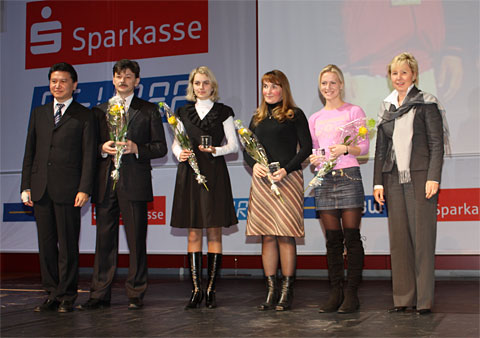
Group B Women: Belarus
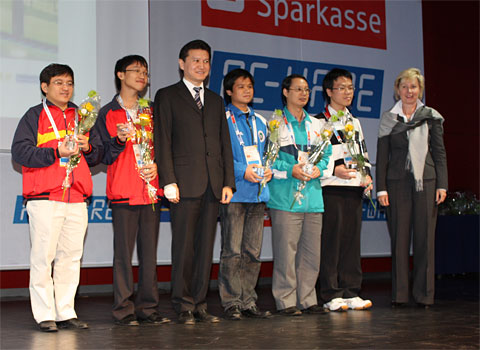
Group B Open: Vietnam
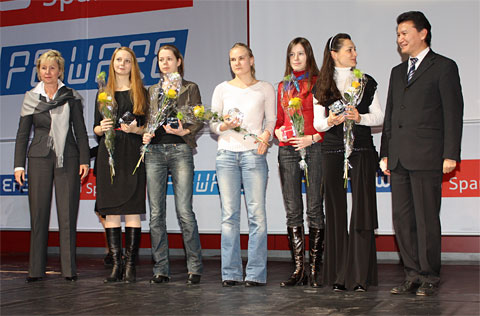
Group A Women: Russia
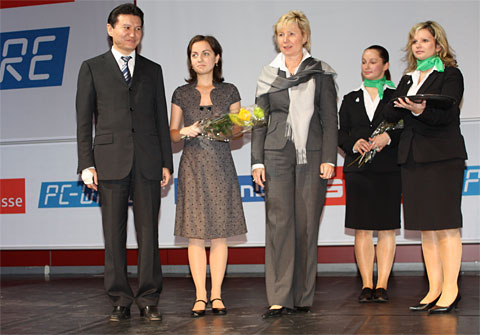
Group A Open: Ukraine (the traumatised team did not turn up)
For these awards the players' performance ratings were compared. Only players who had played a minimum of eight games were eligible for board prizes.
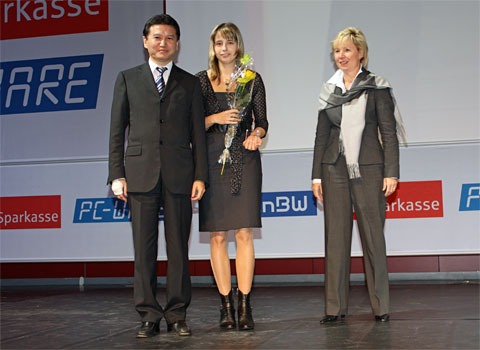
Winner of the Board 5 prize in the women's section: WGM Natalia Zdebskaja, 2419,
Ukraine, 7.0/8

Bronze on Board 4: IM Maia Lomineishvili, 2437, Georgia, 6.0/9
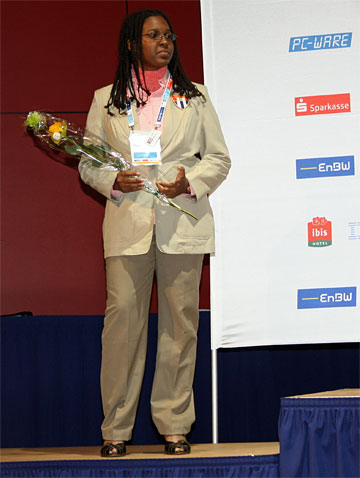
Silver on Board 4: WIM Oleiny Linares Napoles, 2261, Cuba, 9.0/10
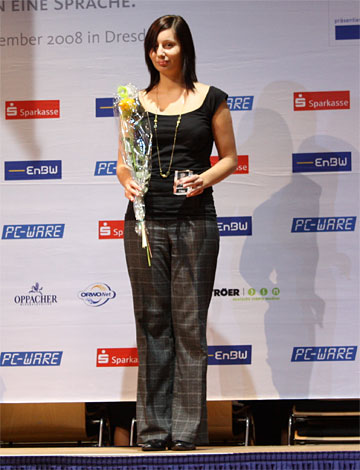
Gold on board 4: WIM Joanna Majdan, 2284, Poland, 9.5/11 (performance: 2621)
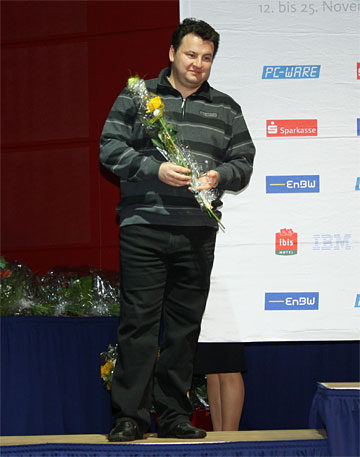
Third on Board 4: GM Daniel Fridman, 2630, Germany 1, 7.0/10
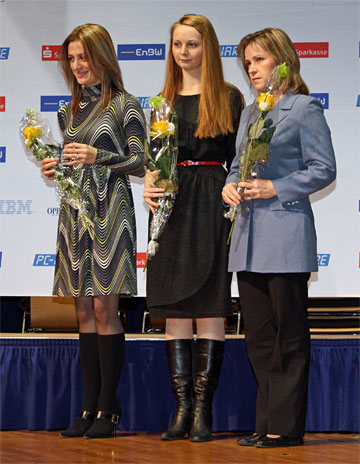
Board 3 prize winners: second WGM Rusudan Goletiani, 2359, USA, 9.0/11;
first: IM Nadezhda Kosintseva, 2468, Russia 8.5/10; third: IM Ildiko Madl, 2376,
Hungary, 8.0/11

Board 2 prize winners: third GM Tiger Hillarp Persson, 2543, Sweden, 8.0/10;
first: GM Gabriel Sargissian, 2642, Armenia 9.0/11; second: GM Vugar Gashimov,
2703, Azerbaijan, 6.5/9
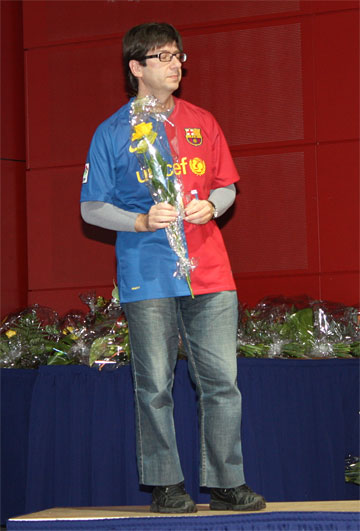
Board 2 Bronze: GM Vasilios Kotronias, 2587, Greece, 8.5/11 (Gold went to GM
Vladimir Akopian, 2679, Armenia 8.0/11 and Silver to GM Francisco Vallejo Pons,
2664, 9.0/11)
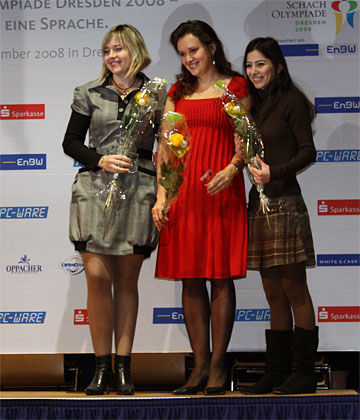
Board 2 winners: second WGM Natalia Zhukova, 2488, Ukraine, 7.0/10; IM Anna
Zatonskih, 2440, USA, 8.0/10; third: IM Lilit Mkrtchian, 2443, Armenia, 8.0/11
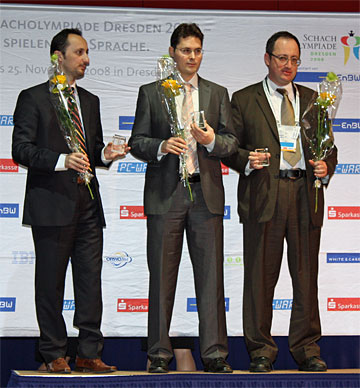
Board 1 winners: third GM Veselin Topalov, 2791, Bulgaria, 6.5/8 (performance
2821); first: GM Peter Leko 2747, Hungary, 7.5/10 (performance 2834); second:
GM Boris Gelfand, 2719, Israel, 7.5/10 (performance 2833)
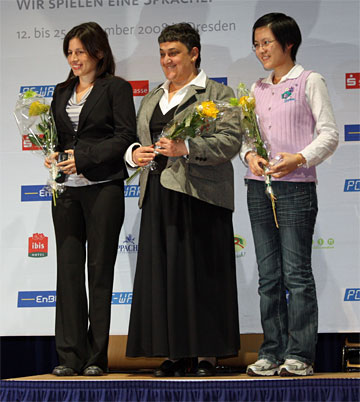
Board 1: second IM Martha Fierro Baquero, 2361, Ecuador 7.5/8 (performance 2613);
first: GM Maia Chiburdanidze, 2489, Georgia, 7.5/9 (performance 2715!); third:
WGM Hou Yifan, 2578, China, 7.5/11 (performance 2563)
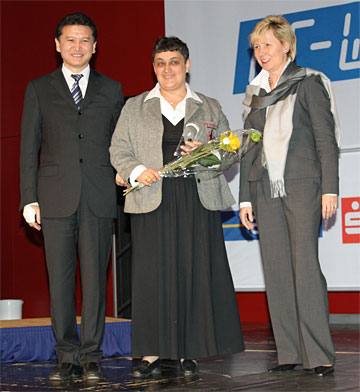
Prize for GM Maia Chiburdanidze for overall best performance in the Women's
Section (2715)

Top performer in the Open Section: GM Gabriel Sargissian, 2642, Armenia,
9.0/11 (2869)
The winning team in the Open Section received the "International Hamilton-Russell Cup", the winning team in the Women's Section the "International Vera Menchik Cup". Both trophies are competed for at each successive Olympiad and cannot be acquired in perpetuity. The dates of the tournament and the name of the winning federation are engraved on the base of the Cup. The winning federations of the tournaments, and the names of their players, are recorded in the FIDE Golden Book, of which the FIDE President has custody.

Bronze medal for the women's team of the USA

Silver medal for the women's team of Ukraine
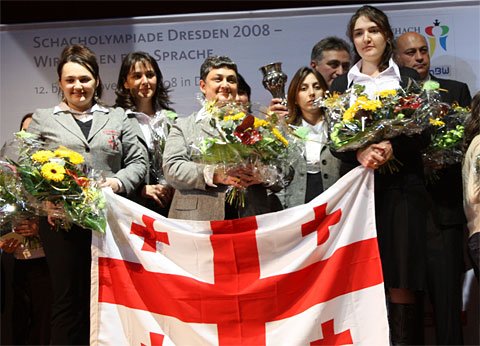
Gold for the women of Georgia
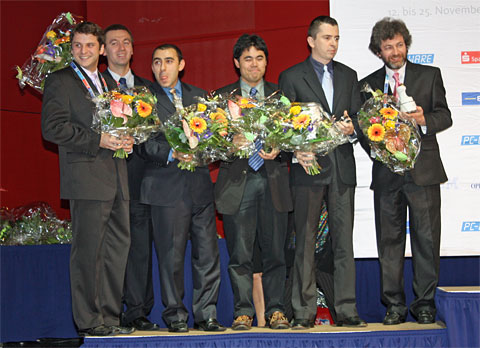
Bronze in the Open Section for USA (yes, he is sticking out his tongue)
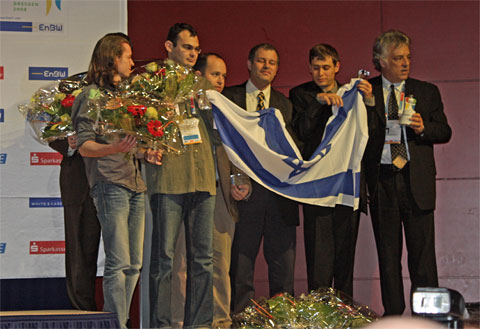
Silver for the Israeli men's team
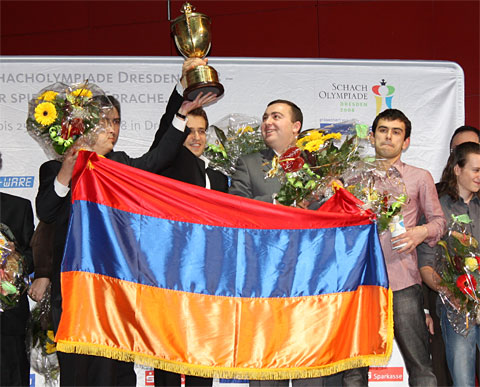
Gold for the Armenians, for the second time in succession
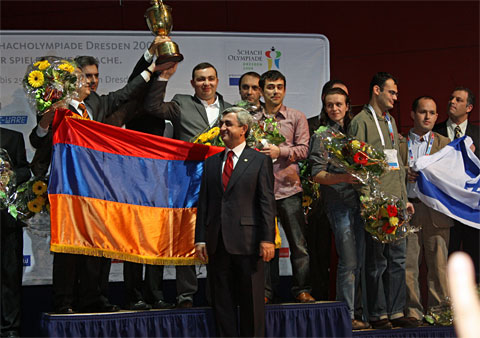
The President of Armenia, Serzh Sargsyan, poses with his victorious team.
After the Olympiad they got to fly back to Armenia on the presidential plane
(Air Force Armenia One)
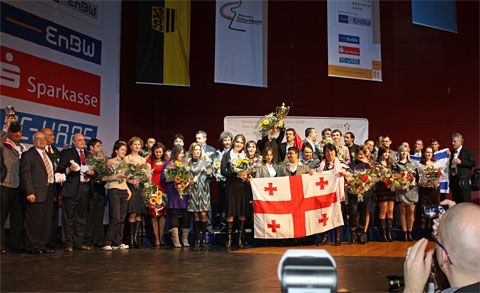
All six victorious teams pose together for the photographers
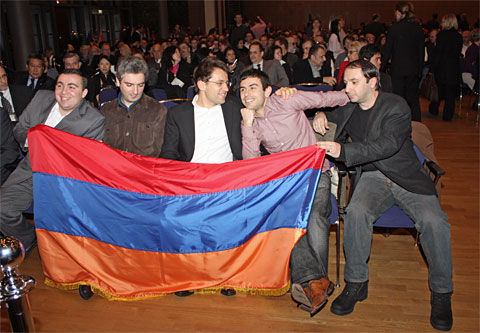
The victorious Armenian team: Tigran Petrosian, Vladimir Akopian, Levon
Aronian and Gabriel Sargissian – all names, you will notice, unimaginatively
end with -ian
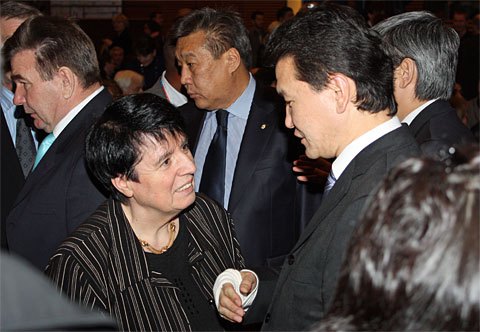
Sixth Women's World Chess Champion (1962-1978) Nona Gapridashvili came to
award a special prize for the best joint men's and women's teams.
The “Nona Gaprindashvili International Trophy” was given for the best composite scores in both the Open and Women's Section of the Olympiad. The winner turned out to be Ukraine, which like Armenia had a total of 35 match points, but 1.5 more board points. The news portal Russia Today reports a mishap that occurred with the trophy:
Leonid Timoshenko, a representative of the Ukrainian Chess Federation, has had a precious diamond he was carrying stolen. He was accompanying a diamond-encrusted cup, which had been won by the Ukrainian National Chess Team in the World-Wide Chess Olympiad in Germany, on a flight from Frankfurt to Kiev. After landing, Timoshenko saw that his bag had been opened up. The cup, which is named after the famous Georgian chess player Nona Gaprindashvili, was broken and the stone had vanished.
The group carrying the cup had flown through Frankfurt on their way back to Kiev. It was in Frankfurt that they were forced to check the cup into baggage. On the previous flight from Dresden they were allowed to take it onboard as a carry-on piece.
The president of the Ukranian Chess Federation, Viktor Petrov, has already filed a report with the police. Mikhael Kravets, Deputy director of aviation security at Boryspil Airport, said that Georgians might be involved in the theft. "Going into the the things of our passengers is widespread among Georgians," he said. "We're wrestling with this problem, but defeating evil that has been accumulating for many years is difficult."
Note: We have been informed by our Ukrainian friend and associate Olena Boytsun that there is a serious error in the English translation by Russia Today of the original Russian language story. The word for baggage handlers at airports is "gruzchik", while Georgians in Russian are called "gruzin". So it was, quite logically, baggage handlers at the Kiev airport who are suspected of stealing the diamond, not "Georgians".
Photos by Natalia and Carsten Straub